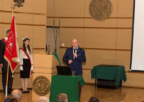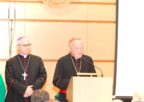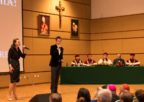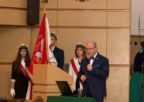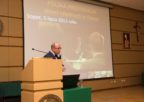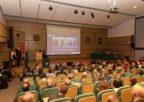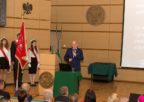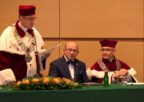At the inauguration of the academic year at the Cardinal Wyszyński University in Warsaw on 7 October 2016, Prof. Henryk Skarżyński had presented a lecture on the development of telemedicine.
Telemedicine means a new quality of healthcare. It makes it possible to monitor many groups, especially seniors, whose number is growing steadily year-to-year. It gives also the possibility to conduct mass population examinations as an instrument of national health policy and finally, the possibility to better utilize the human resources and potential of universities and medical institutes as well as – which is not unimportant – to lower the costs of healthcare system.
It has been 20 years since the establishment of the Institute of Physiology and Pathology of Hearing and 25 years since the beginning of the program of treatment of deafness in Poland. It is not much. But in these years there is the largest in the world number of patients with disorders of hearing and speech who have taken the advantage of the possibilities created by the telemedicine and many modern medical procedures. (…) Our first telemedicine program titled ‘I Can Hear’ has been applied in several tens of countries. This program allowed performing hearing tests through the Internet and its results would show whether the patient could hear well. A negative result was a signal to report to a specialist. In 2000 we had performed first tele-consultations and in 2004 we had introduced the system of tele-rehabilitation. Its name was the ‘Home Rehabilitation Clinic’ and it conveyed the message that for a child with hearing loss the friendliest place to rehabilitate is its home. At home, playing, it can learn to speak. In 2007, the Institute had introduced the first in the world system of the remote fitting of the cochlear implant system. Then in 2009 marks the beginning of the first in the world National Network of Teleaudiology (…).
Today, telemedicine can be found in most medical specialties, including cardiology, radiology, ENT, audiology and rehabilitation. I will refer to the data from the Institute of Cardiology in Anin, who is developing an extraordinary idea of tele-rehabilitation at home enabling monitoring of a patients status outside the medical center. Today we speak about the immense progress in cardiology and the enormous insufficiency of rehabilitation. Telemedicine is a chance to meet the needs with regard to rehabilitation after hospitalization.
We are searching the new ideas for development of Polish science and medicine. There are reasons that such areas as telemedicine could become a Polish trademark and have a great impact on development of European therapeutical standards. In our country there are many excellent medical centers. Important for Polish medicine are solutions that can make modern therapies available for everyone. With telemedical tools we can provide rehabilitation to a significantly larger number of patients.
In the Institute of Physiology and Pathology of Hearing we have been developing telemedicine consistently for many years. In this field we feel we are the ambassadors of Poland and Europe. We have been performing hearing screening on other continents, in Africa, Asia, South America, with friendly support of many people, such as Pallotine brothers in Ruanda and Tanzania last year. We try to promote telemedicine in many ways. Thus an idea of writing a song about telemedicine, and I wrote it with the composer Krzesimir Dębski. The song was performed by Jacek Wójcicki.
Anyone can be a patient, you yourself or your family.
When you feel pain, when your life is threatened, telemedicine will be faster…
Chorus: tele, tele, telemedicine
You already know these services
Because we develop it
You can give a chance to your health…
Telemedicine is my passion. Being a doctor I want to highlight that – as Antoni Kępiński wrote – „Medicine will always remain an art form, because physicians will always have to do with an individual, different person and not a general model”. Developing telemedicine we must keep in mind that technology is not a universal solution. But it can be very helpful in our pro-health activities.
At the end of the ceremony of inauguration of the academic year, the duo Barbara Kaczyńska and Maciej Miecznikowski performed the anthem of the Festival ‘Beats of Cochlea’. It is a song with music composed by prof. Krzesimir Dębski to the poem of prof. Henryk Skarżyński.






